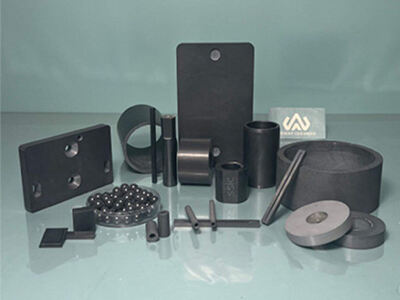Do you wonder what makes ceramic materials so strong and durable? It has a silicon carbide with secret property! This wonderful material is the key to making ceramics stronger and more durable. What, though, is silicon carbide and how does it affect the properties of technical ceramics? Now let's press further more into this exciting subject
The Mystery of Silicon Carbide Revealed
Silicon carbide is a combination of silicon and carbon. Widely considered to be one of the most resilient materials in existence, it also has excellent thermal conductivity-meaning that this garnet becomes a sought-after component when mixed with ceramic compounds. It is for its excellent resistance to wear and strength, a frequent abrasive material in various applications such as grinding wheel It has also been used recently in electric vehicles from Tesla (MWh) motorbikes. Because of these qualities, silicon carbide has a range of uses in the worlds of electronics and power beyond ceramics.
Several Fortuitous Outcomes Resulting From Using Silicon Carbide in Ceramics
The use of silicon carbide in ceramics provides a large number of advantages. The first and foremost property it enhances is the hardness, while wearability of ceramic material. That is ceramic items such as plates, bowls and tiles can last for a long time without breaking or cracking. In addition to that, ceramic products with silicon carbide in them show better thermal conductivity and can hence speed up the process of heating or cooling. This property of ceramics is very useful for its use in kilns and furnaces, where the heat resistance can be greatly appreciated.
Silicon Carbide Epiwafers for Wide-Bandgap Semiconductors
Add the war between silicon carbide and ceramic production into a mix that has more potential for new tech than any other part of this industry segment, then sit back and enjoy creative thinking. An important use of yttria is in the production of advanced ceramic composites that can be operated under extremely high temperature conditions. That's said to be especially important for aerospace, where materials face the extreme heat of space travel. In addition, silicon carbide is in the development of new types of ceramic coatings for use in advanced corrosion resistant, high-temperature and other hard push these capabilities were traditionally reserved only metal alloys industry.
In this article, we will take a closer look at how silicon carbide can be particularly useful in the field of ceramics by mastering its incorporation into these processes.
Marrying silicon carbide to ceramics is a fine art that requires skill. The selection of silicon carbide for its type, and quantity based on requirement is necessary. In addition, the precise application and even distribution of silicon carbide in all through ceramic material. Non-adherence to these guidelines may cause serious damage to the quality and lifespan of ceramic products.
Usher Research Scientist Brian Kim This research study replaces elements within ceramic architecture with silicon carbide to portray morphology, wetting propertyness and behavior.
Given these considerations, when it comes to working the silicon carbide into ceramics, such processes must pass some of the most stringent quality safeties. The use of high-grade silicon carbide is a major component and has been manufactured to meet the most stringent ceramic applications. Furthermore, since incorrect management of silicon carbide is one practices can even lead to damages proper safety procedures must be followed with the compound.
The Wide Range of Silicon Carbide Applications in Ceramics
Silicon carbide has been used for many different types of applications in the world ceramics from production to high-temperature ceramic goods like kiln furniture, crucibles. It is also widely employed in the fabrication of were elevated temperature, wear resistant antagonists ceramic composites and coatings with superior chemical stability.
The abrasive qualities of silicon carbide makes it crucial in improving the quality and durability aspects related to ceramics. Due to its high hardness and excellent thermal shock resistance, it is indispensable in many ceramic products for improving the strength,thermal conductivity. Silicon carbide can enable the manufacture of higher performing, longer-lasting ceramic products when used properly.

 EN
EN
 AR
AR
 HR
HR
 CS
CS
 DA
DA
 NL
NL
 FI
FI
 FR
FR
 DE
DE
 EL
EL
 HI
HI
 IT
IT
 JA
JA
 KO
KO
 NO
NO
 PL
PL
 PT
PT
 RO
RO
 RU
RU
 ES
ES
 SV
SV
 CA
CA
 TL
TL
 IW
IW
 ID
ID
 LV
LV
 LT
LT
 SR
SR
 SK
SK
 SL
SL
 UK
UK
 VI
VI
 TH
TH
 TR
TR
 FA
FA
 AF
AF
 MS
MS
 GA
GA

